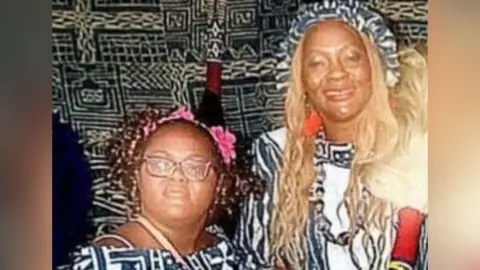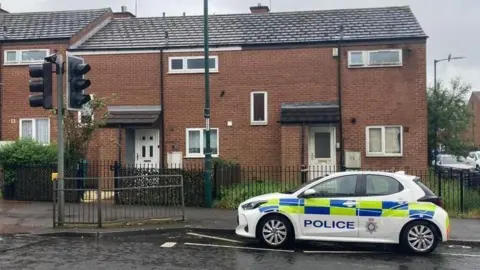BBC News, Nottingham
BBC News, Nottingham
 Other
OtherA disabled teenage girl could have been saved if an ambulance had attended her dying mother’s 999 call – months before they were both found dead in their home, a coroner has concluded.
Nottingham Coroner’s Court heard Alphonsine Djiako Leuga, 47, and 18-year-old Loraine Choulla had been dead for some time before they were found on 21 May 2024 in a house in Hartley Road, Radford.
It was believed Alphonsine died first, in February, while Loraine – who had Down’s syndrome and depended “entirely” on her mum – died of malnutrition and dehydration weeks later.
On Friday, assistant coroner Amanda Bewley said authorities “missed opportunities” to escalate concerns around the pair.
The inquest, which started on Monday, heard Alphonsine had stopped engaging with local services – including social care, medical care and education services – but a reason for this was never identified.
On 2 February 2024, Alphonsine called for an ambulance saying she was cold and could not move, but nobody attended.
Pathologist Dr Stuart Hamilton said he could “not rule out” that Alphonsine might have died on that day.
‘Please come, please’
Alphonsine had been admitted to hospital days earlier as she was critically ill with very low iron levels, but was given a “pragmatic” discharge on 28 January linked to her daughter’s care needs.
In the 2 February 999 call, Alphonsine told the handler she needed help for herself and her daughter.
“Would you send an ambulance? Please come, please,” were the last words she said on the phone before the call ended.
The ambulance never came as it had been wrongly labelled as an “abandoned call”.
The coroner added: “I’m entirely satisfied had an ambulance been sent to Alphonsine, then Loraine would not have died when she did.
“She would most probably have still been alive today.”
Ms Bewley added there “missed opportunities, particularly by Nottingham City Council social care teams, to escalate concerns” around the pair and to involve police in welfare checks.
A passer-by alerted police to the home in May, when Alphonsine and Loraine were discovered.
Ms Bewley said it was “astonishing to [her] that it was that person who took the initiative to call the police”, and not “one of the professionals”.

It was not possible to determine an exact date of deaths for either Alphonsine or Loraine, who came to the UK from Italy in 2016.
However, the coroner concluded Alphonsine, who was born in Cameroon, “more likely than not, died on or after 2 February and before 8 February”.
She concluded it was likely Loraine died on or after 28 February, when activity was last recorded on her Samsung tablet.
Keeley Sheldon, director of quality at East Midlands Ambulance Service, said the service “fully accept” the coroner’s findings.
She said: “I am truly sorry that we did not respond as we should have to Alphonsine Djiako Leuga and Lorraine Choulla. Our deepest condolences remain with their family.
“After our internal investigation, we made changes to our policies, procedures and training to ensure this does not happen in future.”
In a statement, a Nottingham City Council spokesperson said: “We take our responsibilities seriously and have already undertaken a review of relevant policies, procedures and practices to ensure any necessary improvements are made, and that learning is embedded across our services.
“We are committed to acting decisively and continuing to work closely with our partners to safeguard the wellbeing of all Nottingham’s citizens.
“We would like to extend our sincere condolences to the Leuga and Choulla families. Our thoughts are with them at this extremely difficult time.”
- If you have been affected by any of the issues raised in this story, support is available via the BBC Action Line




